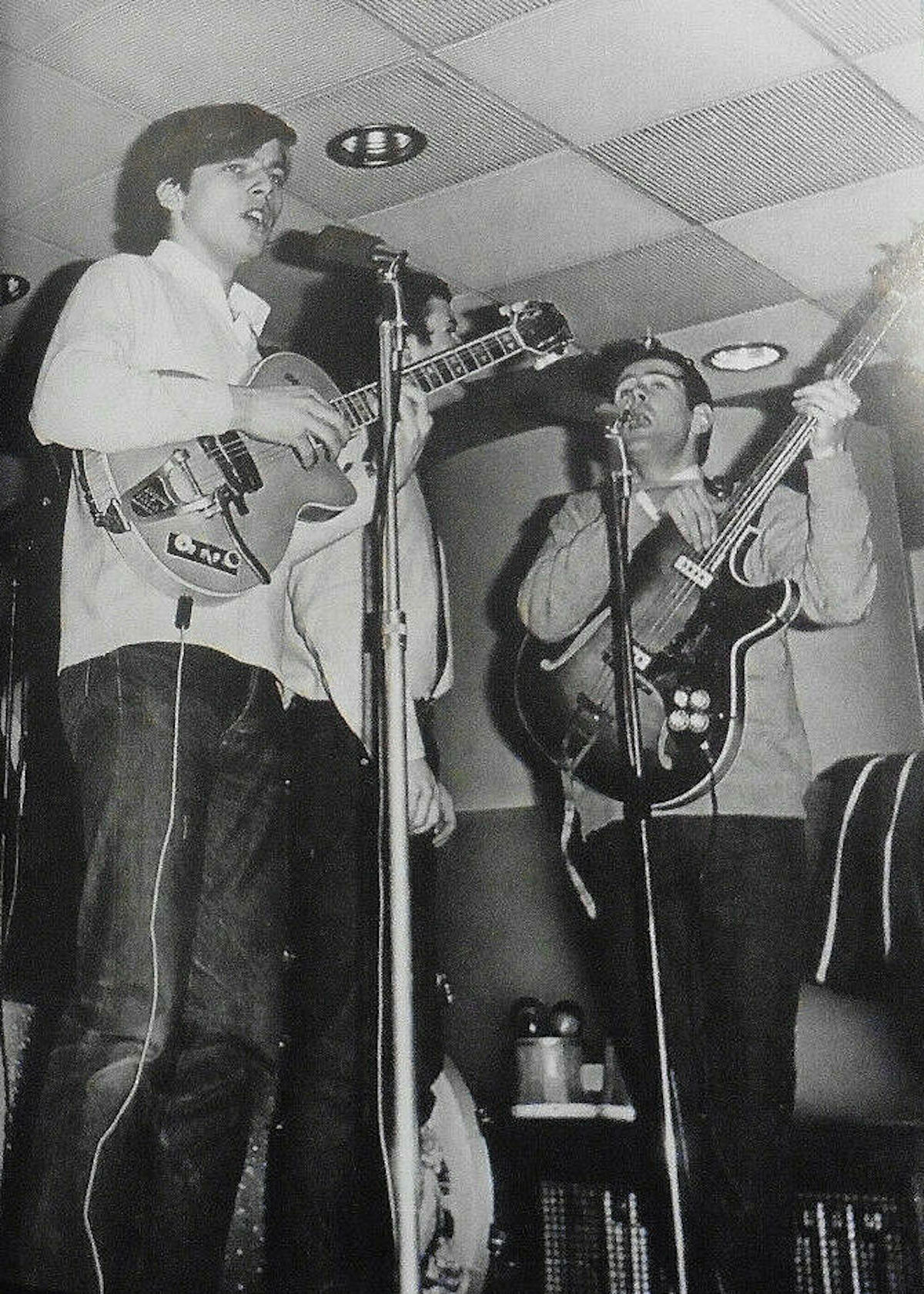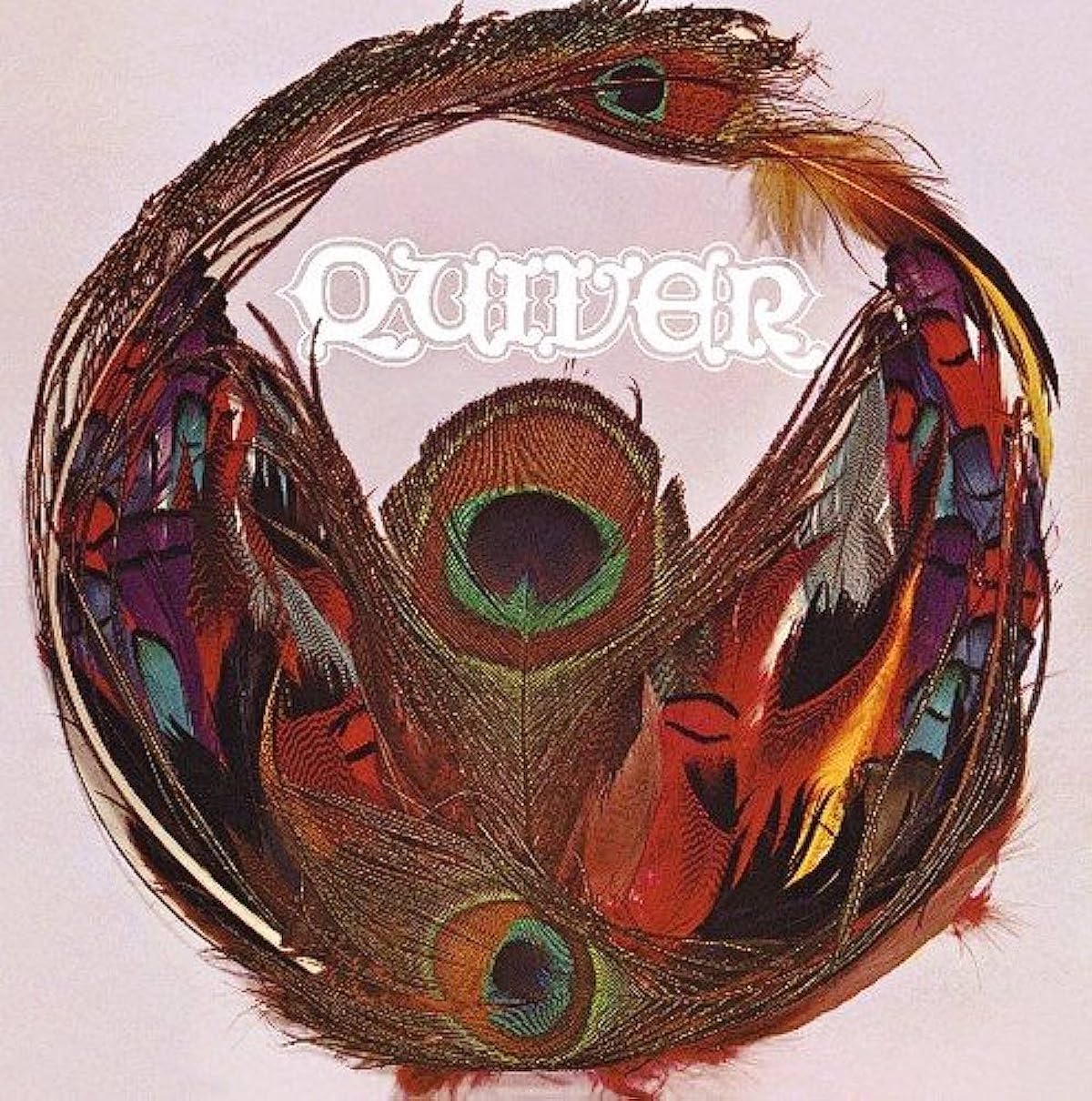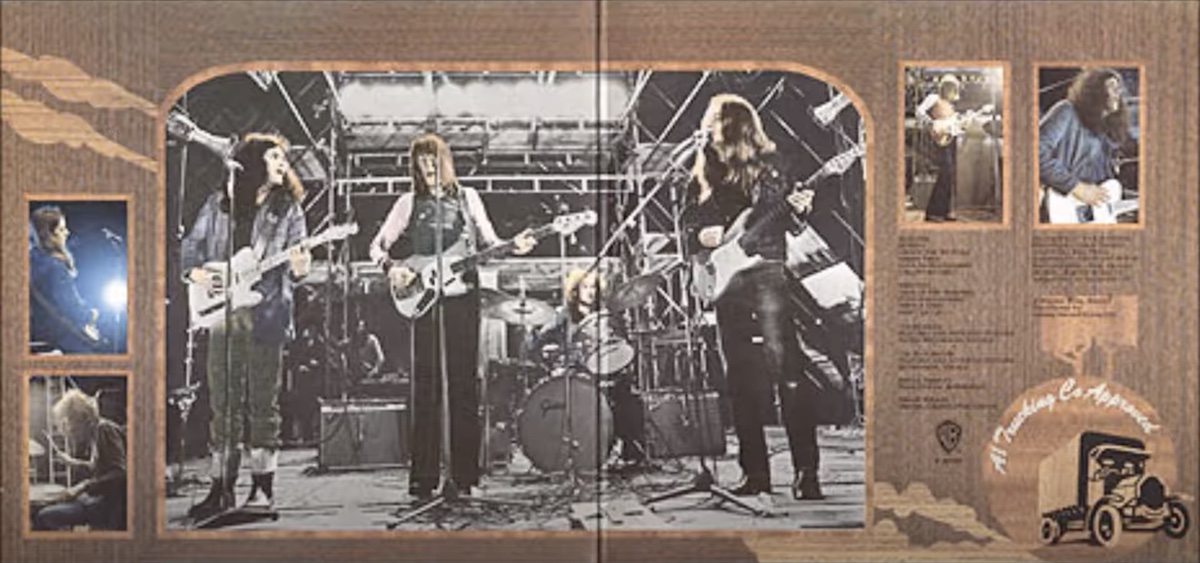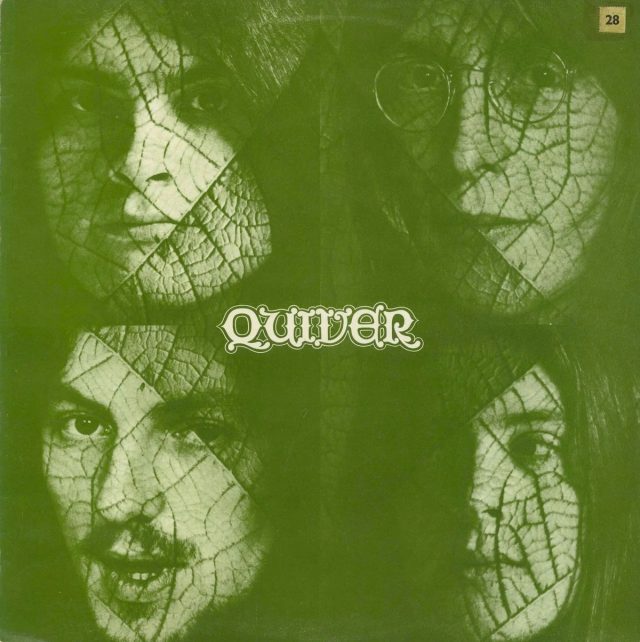 As a Pink Floyd fan, I’ve kept an eye peeled for the debut album by Quiver for probably 25 years. Bands and records related to the Floyd aren’t usually so scarce, but this one seemed to be living on an island somewhere with Randy Quaid, Snuffalupagus and Waldo. Until I spotted it on one of my regular used record store websites for $20. It’s every bit as good as I hoped, particularly the ballad Down Your Way.
As a Pink Floyd fan, I’ve kept an eye peeled for the debut album by Quiver for probably 25 years. Bands and records related to the Floyd aren’t usually so scarce, but this one seemed to be living on an island somewhere with Randy Quaid, Snuffalupagus and Waldo. Until I spotted it on one of my regular used record store websites for $20. It’s every bit as good as I hoped, particularly the ballad Down Your Way.
Quiver’s connections to Pink Floyd are numerous. To trace them, we’ll go back to 1963 and 17-year-old David Gilmour’s Cambridge band Joker’s Wild. The five-piece’s distinction was that all of them sang and did numerous Four Seasons and Beach Boys covers on a scene where most bands had three musicians and a vocalist.

Within two years, the band’s sound was becoming more soul/R&B and the members began to change — including Gilmour’s brother Pete joining briefly as the bass player before being replaced by Rick Wills. John “Willie” Wilson joined after the band’s original drummer suffered a wrist injury. Pianist/saxophone player Dave Altham left and guitarist John Gordon went back to art school — leaving Joker’s Wild as a three-piece. They changed their name to Flowers, and then Bullit, played some shows in France and the U.K. until they had their gear stolen and Gilmour got sick. They broke up in June 1967 and Gilmour went to London to find new gear just as his old school friends (Syd Barrett and Roger Waters) in Pink Floyd were recording their second single See Emily Play. He actually watched the session. That’s when Gilmour first noticed something was weird about the normally charismatic Syd.
Within six months Floyd drummer Nick Mason approached Gilmour to ask him to join the band for gigs, due to Barrett’s growing unreliability. There had been a disastrous tour of the States. By March of 1968, Gilmour had fully replaced Barrett. That left Wills and Wilson with no band. Both joined country-rock outfit Cochise, which occasionally featured Cambridge schoolmate Tim Renwick. Renwick wasn’t a member of Cochise, but provided some guitar parts. I need to find their 1970 album.
Wills then teamed up with Peter Framton (Camel) and finally Foreigner. But before Wills joined Foreigner in 1979, he and Wilson served as Gilmour’s band for his self-titled solo debut in 1978.
Wilson connected with Renwick during their time in Cochise, and agreed to join the band Renwick was starting with Canadian keyboard player/guitarist Cal Batchelor — called Quiver. The other two members of Quiver were bassist Bruce Thomas, who rose to distinction as a member of Elvis Costello‘s Attractions. That’s him doing the famous Pump It Up bassline and the incredible bass tracks in Lipstick Vogue and Living In Paradise.
Thomas’ distinctly busy and melodic style is quite evident on Quiver’s debut album, which came out six years before the first Attractions album My Aim Is True in 1977. As a drummer, I think it might be challenging playing with Thomas, really. The final member of Quiver — the lone Canadian in this story — the late Batchelor. I already mentioned the standout track Down Your Way. Batchelor wrote it, and many others. The guitarist/keyboard player came from a band/duo called Curtiss Maldoon, who were actually on Deep Purple’s record label. Thomas was also in that group, and in a roundabout way, so too was Yes guitarist Steve Howe. See what I did there?
Curtiss Maldoon’s self-titled album came out in 1971, the same year as the debut Quiver album. Roger Quested engineered the former and produced the latter — he who also worked with Led Zeppelin, The Kinks, Paul Simon, John Denver and, yep, Pink Floyd. He was an engineer at Morgan Studios, where Floyd did Meddle, also in 1971. Busy year for Roger. Hipgnosis also did the Cochise cover.
Quiver made two albums, their 1971 debut and Gone In The Morning in 1972, which I still need to get. The band then hooked up with Scottish brothers Gavin and Iain Sutherland and became The Sutherland Brothers & Quiver — making six MOR studio albums.The less about them, the better. The first record was never repressed, re-released and isn’t on Spotify. It wasn’t even issued as an 8-track — you had to buy either the U.K., European, Japanese or North American vinyl, which incidentally, had different cover artwork. Perhaps it was their connection to Gilmour, but both covers have artwork done by Hipgnosis — one of 24 they did that year including Meddle, Electric Warrior and the Electric Light Orchestra debut aka No Answer. The band thank Gilmour on the sleeve, using a pally fake name “Ta, Fred Gilmour.”

The other Pink Floyd person on the record is saxophonist Dick Parry — two years before his famous solo in Money. He actually had yet to play a note on a Floyd song by 1971, but was an old Cambridge friend of Gilmour. Parry and Joker’s Wild bass player Wills were in Soul Committee together years earlier. Parry was a fan of Quiver.
So, here’s a breakdown of Quiver’s Pink Floyd connections:
• Guitarist/vocalist Renwick performed with Pink Floyd on the 1987 and 1994 tours, the Live 8 show and with Waters on his Pros & Cons of Hitchhiking tour. He also plays on Rick Wright’s 1996 solo album Broken China.
• Drummer Wilson was in Joker’s Wild, Flowers and Bullitt with Gilmour. He plays bass on two tracks on Barrett’s first solo album The Madcap Laughs (No Man’s Land and Here I Go). He plays percussion on the 1971 followup Barrett. He played with Renwick in Cochise (credited as John “Sly” Wilson) before they formed Quiver. He stuck around when the band became The Sutherland Brothers & Quiver right through to 1979. Just before that, he and Joker’s Wild (and Cochise) bass player Wills served as Gilmour’s backing band on his self-titled debut solo album in 1978. Wilson was the drummer in the “surrogate band” for Pink Floyd’s The Wall concerts in 1980-’81. Most recently, he performed on Gilmour’s 2006 single Smile.
• Guitarist/vocalist/keyboard player Batchelor was a founding member of Quiver who also played in Curtiss Maldoon with Quiver bass player Thomas. Neither of them had any further Pink Floyd entanglements. Batchelor and his wife Yvonne died nine days apart in Victoria, B.C. in 2015.
• Parry was a Cambridge friend of Gilmour. He played sax on the Pink Floyd songs Money, Us And Them, Shine On You Crazy Diamond, Wearing The Inside Out and toured with the band as showcased on the live album Pulse. Parry also performs on three Gilmour live DVDs. Phew.
Now, back to Quiver’s debut album. It’s quite good, with several excellent songs. The biggest detractor is Thomas’ ADHD-like bass playing. He basically solos alot — but without hooks or any jazz feel. This is basically Americana-type music with a very talented rookie bass player who desperately needed that “less is more” lecture I got from a draft-dodger buddy of mine from Detroit. But let’s go through it. The album opens with two Batchelor songs: Glad I Came Around and the aforementioned Down Your Way.

The first thing you notice about Quiver is they had the two-guitar sound totally down to a science. As good as Wishbone Ash or Grateful Dead in that regard. The tones are excellent — dual electric guitars with a percussive acoustic underneath, with the bass guitar running around like a child after a Pepsi. There are actually a LOT of guitar overdubs on here, I think. And, Quested isn’t shy about actively panning them around. This is essentially top-shelf early ’70s jam band stuff — except for the bits where Thomas starts playing the bassline from I Saw Her Standing There.
Then, it’s Down Your Way, which Batchelor clearly wrote on piano. A lovely ballad with an outstanding lap steel solo. It’s looseness only adds to the feel. Both Renwick and Batchelor are extremely talented rhythm players.
Next is the eight-minute epic Killer Man, written by Renwick. This is kind of soundtrack music except most of the band is scoring a road movie while Thomas is scoring porn. He basically ruins the song. Not only is he busy as a bee throughout, but he also gets a solo. FFS. It’s an awful long song, boys.
There are two more Batchelor songs after that — Take A Train is very Eagles-esque, rounding out the first side of the album. Again, the dual guitar stuff is so great — even Thomas seems to be a little restrained. Maybe they drugged him.
Side 2 starts with Cool Evening, the most Pink Floydy song on the record. Kind of like a subdued version of the Funky Dung section of Atom Heart Mother, fed through a middle-of-the-night Neil Young machine. Again, Thomas doesn’t ruin this one. He does however, get a writing credit on the next two songs. Barnes County is a group composition and is very Americana. Think the real countrified Grateful Dead or The Band. Not my jam, but I get it. It’s 1971.
Thomas is the sole songwriter of the next track, Back On The Road. It’s not a great one — a throwaway song about playing in a band, staying in a hotel and coming home to my baby: “It will be funky country music all night long.” The best part is the guitar solo outro. It’s really great. A Batchelor shortie is next: The playful two-acoustic waltz Just Loving You. It feels a lot like a kids’ song, with slightly unpredictable changes.
The album ends with a banger. Reason For Staying is kind of like what would happen if you got the pre-KISS band Wicked Lester to cover Let It Bleed by The Rolling Stones. This is the only track to feature Parry and his sax. Thomas behaves, and this track sounds like one the band really enjoys playing.
3/5
https://www.youtube.com/watch?v=i4bL5965Xok&list=PLqS9KGcuks7etNs0by9dRoVDdxXpI-8IH&index=9
• • •
Area Resident is an Ottawa-based journalist, recording artist, music collector and re-seller. Hear (and buy) his music on Bandcamp, email him HERE, follow him on Instagram and check him out on Discogs.











































